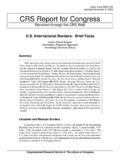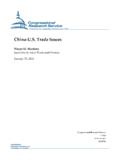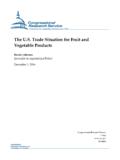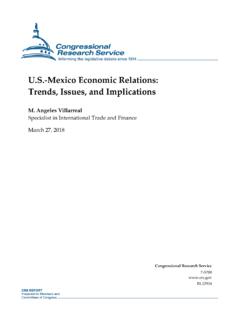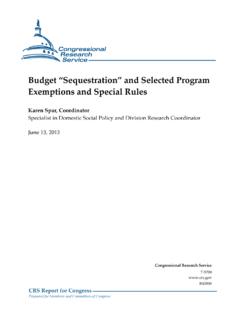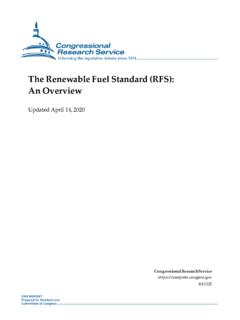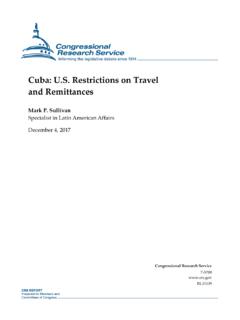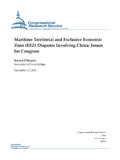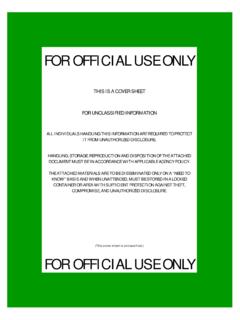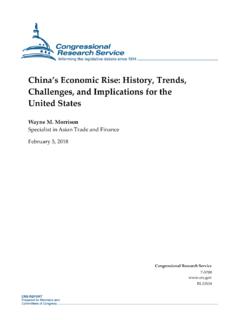Transcription of Awards of Attorneys' Fees by Federal Courts and Federal ...
1 Order Code 94-970 Awards of Attorneys Fees by Federal Courts and Federal AgenciesUpdated June 20, 2008 Henry CohenLegislative AttorneyAmerican Law DivisionAwards of Attorneys Fees by Federal Courtsand Federal AgenciesSummaryIn the United States, the general rule, which derives from common law, is thateach side in a legal proceeding pays for its own attorney . There are many exceptions,however, in which Federal Courts , and occasionally Federal agencies, may order thelosing party to pay the attorneys fees of the prevailing party. The major commonlaw exception authorizes Federal Courts (not agencies) to order a losing party that actsin bad faith to pay the prevailing party s fees. There are also roughly two hundred statutory exceptions, which were generallyenacted to encourage private litigation to implement public policy.
2 Awards ofattorneys fees are often designed to help to equalize contests between privateindividual plaintiffs and corporate or governmental defendants. Thus, attorneys feesprovisions are most often found in civil rights, environmental protection, andconsumer protection addition, the Equal Access to Justice Act (EAJA) makes the United Statesliable for attorneys fees of up to $125 per hour in many court cases andadministrative proceedings that it loses (and some that it wins) and fails to prove thatits position was substantially justified. EAJA does not apply in tax cases, but asimilar statute, 26 7430, Supreme Court decisions involving attorneys fees have interpreted civilrights statutes, and this report focuses on these statutes.
3 It also discusses Awards ofcosts other than attorneys fees in Federal Courts , how Courts compute the amount ofattorneys fees to be awarded, statutory limitations on attorneys fees, and othersubjects. In addition, it sets forth the language of all Federal attorneys feesprovisions, and includes a bibliography of congressional committee reports andhearings concerning attorneys fees. In 1997, Congress enacted a statute allowing Awards of attorneys fees to someprevailing criminal Introduction: The American Rule and its Common Law Exceptions to the American Rule ..2 Common Benefit Doctrine ..3 Bad Faith attorney General The Equal Access to Justice Act ..6IV.
4 The Dual Standard: Prevailing Plaintiffs and Prevailing The Concept of Prevailing Awards of Attorneys Fees Incurred in Administrative of Attorneys Fees by Administrative Agencies ..23 VII. Awards of Attorneys Fees in Civil Rights Cases ..25 Civil Rights Act of 1964, Title II: Public Rights Act of 1964, Title III: Public Rights Act of 1964, Title VII: Equal Employment Housing Act ..27 Fair Labor Standards Act ..28 Age Discrimination in Employment Act of Credit Opportunity Rights Act of Service Reform Act of Discrimination Act of Rights of Institutionalized Persons Act of with Disabilities Education with Disabilities Act of Rights attorney s Fees Awards Act of IX of Freedom Restoration Act of Religious Land Use and Institutionalized Persons Act of Rights Act of 1964, Title VI: Federally Assisted Against Women Act of Awards of Attorneys Fees in Tax Awards of Attorneys Fees Against the of Attorneys Fees Against State Judges.
5 45X. Awards of Costs in Federal Courts ..46 Awards of Costs For and Against the United States ..48XI. Determining a Reasonable Attorneys Fee ..48 XII. Rule 68 of the Federal Rules of Civil Procedure ..54 XIII. Negotiated Fee Statutory Limitations on Attorneys Funding of Participants in Federal Agency Proceedings ..59 XVI. Some Arguments For And Against The American Rule ..61 XVII. Awards of Attorneys Fees to Prevailing Criminal Statutes That Authorize Awards of Attorneys Fees ..64 Bibliography of Congressional Publications ..115 Committee Prints and Key Tronic Corp. v. United States, 511 809, 814-815 (1994) (holding that the phrase any other necessary costs of response incurred by any other person in 107 of theComprehensive Environmental Response, Compensation, and Liability Act, 42 9607, does not include attorneys fees).
6 2 See, CRS report 92-237, Attorneys Fees: The Bush Administration Proposal to Adopt theEnglish Rule by Henry Cohen (archived, available from author); CRS report 95-27,Common Sense Legal Reforms Act of 1995: Title I Civil Justice Reform (Attorneys Fees,Products Liability, Etc.), by Henry Cohen (archived, available from author). The AttorneyAccountability Act of 1995, 988, 104th Cong., which grew out of the Common SenseLegal Reforms Act of 1995 (which was part of the House Republicans Contract WithAmerica ), passed the House. It would have required, among other things, the payment ofattorneys fees in connection with rejected settlement offers in diversity The Supreme Court has noted a third exception: a court may assess attorney s fees as a( ) Awards of Attorneys Fees byFederal Courts and Federal AgenciesI.
7 Introduction: The American Rule and its Exceptions In the United States, the prevailing litigant is ordinarily not entitled to collecta reasonable attorneys fee from the loser. Alyeska Pipeline Service Co. Society, 421 240, 247 (1975). This is known as the American rule (as opposed to the English rule, which routinely permits fee-shifting) and derivesfrom court-made law. It has, however, numerous statutory exceptions (listed at theback of this report ) some, if not most, of which Congress enacted in order toencourage private litigation to implement public policy. Id. at 263. Under theseexceptions, a Federal court (and sometimes a Federal agency) may order the losingparty to a lawsuit to pay the winning party s attorneys fees.
8 Although attorney sfees generally are not a recoverable cost of litigation absent explicit congressionalauthorization, .. [t]he absence of specific reference to attorney s fees is notdispositive if the statute otherwise evinces an intent to provide for such fees. 1 Fee-shifting has been proposed, not only to encourage lawsuits, but todiscourage them, especially tort suits. The English loser pays rule was includedin tort reform legislation proposed by the Bush Administration in 1992, and in TheCommon Sense Legal Reforms Act, which is part of the Contract With America proposed by the Republican House Members in American rule has two major common law exceptions (instances whenfederal Courts may award attorneys fees without statutory authorization): thecommon benefit doctrine and the bad faith These derive from the historicCRS-23 (.)
9 Continued)sanction for the willful disobedience of a court order. Chambers v. NASCO, Inc., 32, 45 (1991). However, this may be viewed as falling within the bad faith Sprague v. Ticonic National Bank, 307 161, 166 (1939).5 See, United States v. Horn, 29 754, 759 (1st Cir. 1994) (sovereign immunity precludesuse of supervisory power to order the United States to pay the fees and costs incurred bycriminal defendants in litigating prosecutorial misconduct issue; but see, 105-119(1997), discussed below in Ch. XVII). Although the Supreme Court noted in Chambers,supra note 3, that the exercise of the inherent power of lower Federal Courts can be limitedby statute or rule, for [t]hese Courts were created by act of Congress (501 at 47; theSupreme Court was created by the Constitution, Art.
10 III, 1), the court of appeals in Hornwrote: It is not yet settled whether some residuum of the Courts supervisory power is sointegral to the judicial function that it may not be regulated by Congress (or, alternatively,may only be regulated up to a certain point). 29 at 760 authority of the Courts to do equity in a particular situation. 4 This authority hasbeen called the supervisory or inherent power of the Federal Courts may use this inherent power even in diversity cases, which arecases arising under state law that are brought in Federal court pursuant to 28 1332 when the parties are citizens of different states and the amount in controversyexceeds $50,000. Chambers v. NASCO, Inc.
